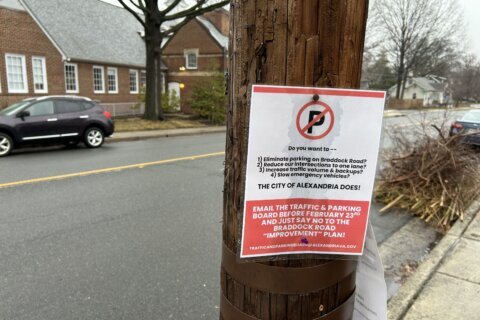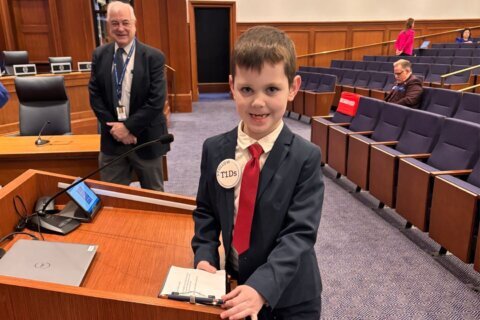This article was republished with permission from WTOP’s news partner InsideNoVa.com. Sign up for InsideNoVa.com’s free email subscription today.
This article was written by WTOP’s news partner InsideNoVa.com and republished with permission. Sign up for InsideNoVa.com’s free email subscription today.
Coming out of the COVID-19 pandemic, Northern Virginia leaders want to make strides in affordable housing across the region.
Housing was among the many topics touched on by top elected officials Aug. 25 at the seventh annual Northern Virginia Regional Elected Leaders Summit at George Mason University in Arlington.
The event was hosted by several Northern Virginia chambers of commerce, and the panel included Prince William County Supervisor Margaret Franklin, Fairfax County Board of Supervisors Chair Jeff McKay, Loudoun County Board of Supervisors Chair Phyllis Randall, Arlington County Board member Katie Cristol and Alexandria Mayor Justin Wilson.
The panelists said affordable housing should be a huge priority for all localities in Northern Virginia as prices continue to spike.
“People think of affordable housing as a young professional problem, and I think it’s really important to know that this generation of families cannot afford to keep their roots in Northern Virginia,” Cristol said. “A pathway that was very attainable to someone 25 years ago does not exist today … This is not just a problem of our very low-income neighbors. This is a problem of our middle class, even our upper middle class.”
Franklin said each locality must decide the importance of affordable housing. She said Prince William is “at a crossroads” and highlighted recent proposals to expand land-use decisions countywide.
“Those discussions have become very controversial because we’re looking at expanding housing all across the county, not just in certain areas,” she said. “In Prince William County, you have a board that is willing to go as far as we need to go to ensure that housing is spread out and not just concentrated in certain parts of the county.”
McKay, of Fairfax, said housing should be seen “as an investment and not an expense.”
“We have to build affordable housing everywhere in this region,” he said. “One of our problems is it was politically acceptable to build it in small areas and small pockets in counties and cities that were deemed politically OK with that.”
The officials also discussed one of the positive impacts on government services from the COVID-19 pandemic: electronic participation in meetings.
McKay said the solely in-person model was “leaving people out of the equation in terms of testimony, and that’s something none of us should be supporting.”
“Even the person who wants to testify on one particular zoning ordinance shouldn’t have to sign up days in advance and drive a long distance to the government center, take time off work potentially,” he said. “There’s no reason why these things can’t become permanent.”
The pandemic has also required some different approaches to economic development, as office space isn’t as prioritized with some employers adopting total or hybrid work-from-home models.
Franklin said Prince William is focusing on revitalization and redevelopment, particularly in the U.S. 1 corridor.
“Prince William is going through what I call the teenage years where we’re going into adulthood of finally coming into our own, and economic development is going to be the capstone to help us do that,” she said.
The panelists also touched on transportation, particularly the Metro system and its recent struggles coming out of the pandemic.
Wilson said although Metro is “having a tough time … we cannot afford for Metro to fail.”
Franklin advocated for a Metro expansion to Prince William, saying there is “no reason at this point why we shouldn’t have access to our Metro system.”
A brief tense exchange occurred around the discussion of schools. Randall railed against Gov. Glenn Youngkin and Republicans who have attacked Loudoun schools over the past year.
One of the hot-button subjects has been critical race theory, an overarching term applying to graduate-level law studies focusing on how issues of race are interwoven into U.S. history through government and private policies. One example is redlining, in which banks refused to give mortgages to Black people or imposed harsh terms.
The theory has become a battle cry among conservative groups, who say it is being taught in all levels of schooling and assigns the blame of past racist actions to current children.
Local and state school officials in Virginia have said the theory is not being taught and that people are conflating equity initiatives and culturally-responsive teaching with critical race theory.
“I am really tired of the governor running a campaign against our school systems. He does not know what he’s talking about. I have had it with Gov. Youngkin attacking school systems and attacking Loudoun County schools,” Randall said. “If the only way you can get elected is attacking teachers by calling them groomers and attacking educators then maybe you shouldn’t be in office.”
As Randall said “what has happened to our teachers is a travesty,” someone in the audience shouted that Youngkin is “attacking CRT and Marxist ideologies.”
“There is no teaching of CRT in public schools,” Randall said. “And if your child is learning CRT, you should be proud because your child is a genius that they’re taking a graduate-level class.”







